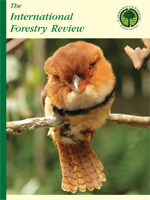Climate change impact analyses have focused mostly on natural distributions of plants and have generally ignored their intrinsic climatic adaptability. This may produce unreliable predictions of impacts. Eucalypts are potentially instructive for climate change studies, as many species have been assessed in commercial forestry trials outside the conditions of their natural distributions. However, rare eucalypt species, which usually have limited natural distributions, and are likely to be most susceptible to climate change, are often small or multi-stemmed species, which have generally not been included in commercial trials. This study used information for 12 rare eucalypt species from the PlantSearch database of Botanic Gardens Conservation International and assessed if this information can assist determining their climatic adaptability. The results should be treated with caution, but indicate that most of the 12 species are growing at some botanic gardens under annual mean temperature conditions that are warmer than where they occur naturally.
How to translate text using browser tools
1 June 2015
Using a Global Botanic Gardens Database to Help Assess the Capabilities of Rare Eucalypt Species to Cope with Climate Change
T.H. Booth
ACCESS THE FULL ARTICLE

International Forestry Review
Vol. 17 • No. 3
September 2015
Vol. 17 • No. 3
September 2015
climate change impacts
eucalypts
forestry
phenotypic plasticity




